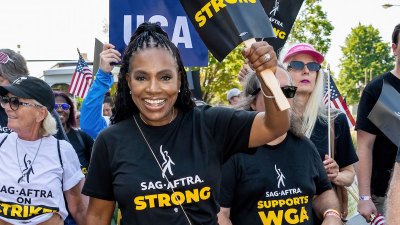
The Writers Guild of America has reached a temporary agreement with the Alliance of Motion Picture and Television Producers to end the strikes that have halted production for four months.
The three-year contract was proposed on Sunday, September 24, after five days of negotiations, effectively putting a stop to the picket lines. (The strike itself will remain in progress through the approval and ratification process, per Variety.)
Details of the contract are expected to be released as the final language is determined. The guild issued a statement to its members on Sunday, noting in part, “We can say, with great pride, that this deal is exceptional — with meaningful gains and protections for writers in every sector of the membership.”
The WGA and AMPTP issued a rare joint statement on Wednesday, September 20, to announce that the two organizations had “met for bargaining today and will meet again tomorrow” amid reports that a deal was close to being reached.
The WGA, which represents more than 11,000 writers, went on strike in May, while SAG-AFTRA, which represents approximately 160,000 actors, followed suit two months later. Prior to the agreement, the WGA was nearing the record for the longest strike in its history. The work stoppage in 1988 lasted 154 days, while Sunday marked the 2023 strike’s 146th.

Both unions asked the AMPTP for better wages, increased residual payments from streaming services and protections against the use of artificial intelligence. Work on most major productions had already shut down in May due to the writers’ strike. Though filming for some talk shows could have resumed if only the WGA reached a deal, actors would not have been allowed to return to sets as long as SAG-AFTRA was still on strike.
In a message shared via social media on Sunday, SAG-AFTRA congratulated the WGA on the new development. “We look forward to reviewing the terms of the WGA and AMPTP’s tentative agreement. And we remain ready to resume our own negotiations with the AMPTP as soon as they are prepared to engage on our proposals in a meaningful way,” the organization noted.
Earlier this month, Warner Bros. Discovery CEO David Zaslav hinted that studio heads were prepared to do what was needed to end the writers and actors’ strikes. “We need to do everything we can to get people back to work,” he said at an investors conference. “We really have to focus as an industry and we are on trying to get this resolved in a way that’s really fair.”
While the studios have been able to tide fans over in the months since the strikes began with projects that were already filmed, some companies were open about the financial strains caused by the unions’ efforts. Warner Bros. Discovery warned investors of a $300 million to $500 million loss by the end of the year, and CNN reported earlier this month that the strikes had already cost multiple industries a combined $5 billion.
Meanwhile, the strikes disrupted the fall TV schedule, which is typically filled with season and series premieres in September and October. As reality shows replaced the usual scripted fare across the major networks, Fox entertainment president Michael Thorn told Deadline that if the strikes did not end by October 1, it would be difficult to salvage the TV season as a whole. “You’re going to get to a point in the fall, in the late fall, where it’s going to be very hard to launch [scripted shows] within the traditional TV viewing season,” he said earlier this month.











